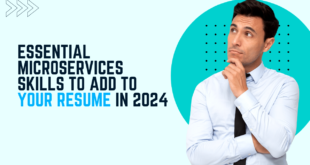In the rapidly evolving world of technology, data management systems play a crucial role in how businesses operate. Among these, MongoDB stands out as a leading NoSQL database known for its flexibility, scalability, and performance. If you’re eager to carve out a career as a MongoDB developer in 2024, you’re in the right place! In this article, we’ll explore the essential steps you need to take, key skills to develop, and tips for acing those all-important MongoDB interview questions.
Why Choose MongoDB?
Before diving into the career path, let’s discuss why MongoDB is a worthwhile choice. With its document-oriented structure, MongoDB allows developers to store data in flexible, JSON-like documents. This means you can adapt to changing data requirements without the constraints of traditional relational databases. Moreover, as companies increasingly migrate to cloud-based solutions, the demand for skilled MongoDB developers continues to rise.
Getting Started: The Basics of MongoDB
What You Need to Know
To start your journey as a MongoDB developer, familiarize yourself with the basics. Here are a few foundational concepts:
- Documents and Collections: In MongoDB, data is stored as documents, which are grouped into collections. Each document is a JSON-like structure, allowing for a flexible schema.
- CRUD Operations: Learn how to perform Create, Read, Update, and Delete operations using MongoDB’s query language.
- Indexes: Understand how to create and manage indexes for improving query performance.
Resources for Learning
If you’re wondering where to begin your learning journey, numerous resources are available:
- Official Documentation: The MongoDB documentation is a treasure trove of information.
- Online Courses: Platforms like Coursera and Udemy offer comprehensive courses tailored to beginners and advanced users.
- Books and Tutorials: Look for popular books that focus on MongoDB development and best practices.
Developing Essential Skills
Programming Languages
While MongoDB itself is a powerful tool, proficiency in programming languages is crucial for a developer. The most commonly used languages in conjunction with MongoDB include:
- JavaScript: Particularly with Node.js, it’s a popular choice for web development.
- Python: Widely used in data analysis, machine learning, and web applications.
- Java: A robust choice for enterprise-level applications.
Understanding Data Modeling
Data modeling is vital in creating efficient database structures. As a MongoDB developer, you should be comfortable designing schemas that reflect the application’s needs. This means knowing how to use embedded documents and references effectively.
Familiarity with Cloud Services
As more companies adopt cloud solutions, familiarity with platforms like AWS, Google Cloud, and Azure is essential. MongoDB Atlas, the cloud version of MongoDB, simplifies deployment and scaling, making it a valuable skill.
Hands-On Experience
Practical experience is indispensable. Create your own projects or contribute to open-source projects to gain real-world experience. Here are a few project ideas to get you started:
- Build a simple CRUD application using Express.js and MongoDB.
- Create a blog platform that allows users to post, edit, and delete content.
- Develop a data analysis tool that aggregates and visualizes data from a MongoDB database.
Preparing for MongoDB Developer Roles
Crafting Your Resume
When you’re ready to apply for positions, your resume should highlight relevant skills and experiences. Focus on:
- Projects: Showcase your MongoDB projects, detailing the technologies used and the challenges you overcame.
- Certifications: Consider obtaining MongoDB certifications, which can enhance your credibility.
- Soft Skills: Highlight communication skills and teamwork, as these are highly valued in collaborative environments.
Networking and Building Your Presence
Connecting with professionals in the field can open doors to job opportunities. Consider:
- Joining Online Communities: Participate in forums, such as Stack Overflow or the MongoDB community forums.
- Attending Meetups and Conferences: Engage with others in the field and learn about the latest trends and technologies.
- LinkedIn Networking: Share your projects and insights to attract potential employers.
Ace the Interview: MongoDB Interview Questions
When it comes to securing a job as a MongoDB developer, preparing for interviews is key. You’ll likely encounter a range of MongoDB interview questions that assess your technical knowledge and problem-solving abilities. To help you prepare, check out this resource on MongoDB interview questions.
Common Interview Topics
- Data Modeling and Schema Design: Be ready to discuss how you would structure data for a specific application.
- Performance Tuning: Understand how to optimize queries and manage indexes.
- Aggregation Framework: Familiarize yourself with MongoDB’s aggregation pipeline for data processing.
Mock Interviews
Consider conducting mock interviews with peers or using platforms like Pramp to practice your responses and improve your confidence.
The Future of MongoDB Development
As you embark on your journey to become a MongoDB developer, it’s essential to keep an eye on emerging trends. The tech landscape is constantly changing, and being adaptable is vital for long-term success.
Staying Updated
- Follow Blogs and News: Stay informed about MongoDB’s new features and updates by following their official blog and subscribing to industry newsletters.
- Engage with the Community: Participate in discussions on platforms like Reddit or Dev.to to learn from others and share your insights.
Conclusion
Starting a career as a MongoDB developer in 2024 is not only exciting but also full of opportunities. By understanding the fundamentals, developing essential skills, and preparing for interviews, you’ll position yourself as a valuable asset in today’s data-driven world. Remember to leverage the many resources available to you, and don’t hesitate to engage with the community as you embark on this journey. With determination and passion, you can thrive in your MongoDB career.
FAQ:
Q1: What qualifications do I need to become a MongoDB developer?
A: While formal education can help, many MongoDB developers come from diverse backgrounds. Focus on building your skills through courses, projects, and practical experience.
Q2: How can I gain practical experience in MongoDB?
A: Work on personal projects, contribute to open-source projects, or seek internships that focus on database development.
Q3: Are MongoDB certifications worth it?
A: Yes, certifications can enhance your resume and demonstrate your expertise to potential employers.
Q4: What are some common tools used with MongoDB?
A: Popular tools include MongoDB Compass for data visualization and management, and Mongoose for object data modeling in Node.js applications.
By following the guidelines in this article, you’re well on your way to a successful career as a MongoDB developer. Embrace the journey and keep learning!
 Your Daily Dose of Entertainment Unleashing Movie Magic, One Post at a Time
Your Daily Dose of Entertainment Unleashing Movie Magic, One Post at a Time



